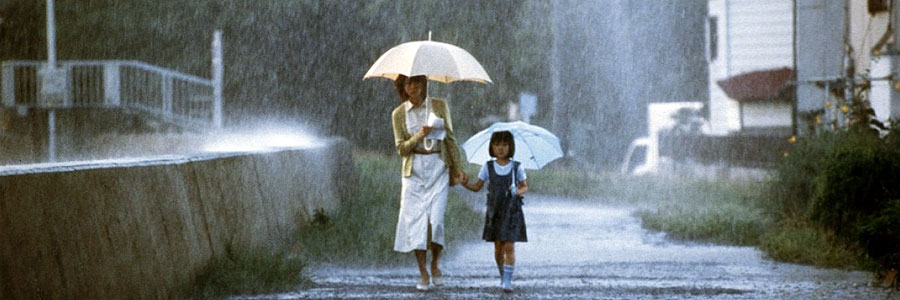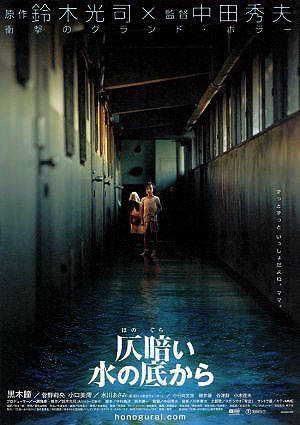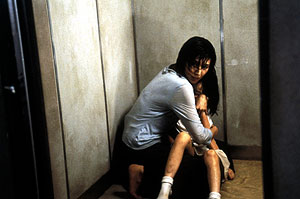
Dark Water

DARK WATER (MOVIE)
Toho Company Ltd.
Original release: January 19th, 2002
Running time: 101 minutes
Country of origin: Japan
Original language: Japanese
Director: Hideo Nakata
Writers:Hideo Nakata, Takashige Ichise, Yoshihiro Nakamura
Cast: Hitomi Kuroki, Rio Kanno, Asami Mizukawa, Mirei Oguchi

Those cold dead eyes and the white, menacing face covered with long black hair have certainly come a long way since the 17th century. There are many popular Japanese films revolving around the now familiar image of the indestructible vengeful spirit terrorising the living, but perhaps we can single out three that may be credited with bringing the malicious ghost outside Japan.
In 1998, Hideo Nakata made Ring with an updated version of the old antagonist inhabiting modern technology of the time such as videotapes, television and the telephone. Two more films were released in 2002; Ju-on: The Grudge directed by Takashi Shimizu and Dark Water by Hideo Nakata, who returned to the ghostly concept four years after making Ring and its sequel. The three movies became very popular outside Japan and also ended up with the ‘badge of honour’ that is the American remake.
Shimizu’s Ju-on has to be the most faithful to the traditional concept that the Japanese call “Onryo” since it first appeared in the theatrical performances known as “Kabuki” in the 17th century. The Grudge is masterful in its ability to frighten and its antagonist stays true to its own origins, beautifully juxtaposing tradition with modern cinema. That is certainly something I can appreciate and I hold Ju-on in very high regards, but Nakata’s Dark Water is the film that I find most emotionally engaging.
The exploration of the terrorized is by far the most in-depth in Dark Water and their outlook could not be any further from mere curious or inquisitive. The struggling single mother Yoshimi (Hitomi Kuroki) is in the middle of a messy divorce and her options are always limited as to what she can do to overcome obstacles in her life. What struck me about Yoshimi’s character was that she was in a really bad place to begin with; her struggle draws us in without any supernatural intervention. In the absence of the vengeful spirit, Dark Water makes for an engaging drama about a woman in a gritty game of chess against her husband where just one wrong move could mean that Yoshimi loses custody of her 6 years old daughter, Ikuko (Rio Kanno).

A menacing Onryo is lurking around the corner nevertheless. Yoshimi and Ikuko move into an apartment in a run-down area and as soon as they do, the sinister presence begins to take an interest in both of them. While Ikuko seems hypnotised by it at times, Yoshimi’s motherly instincts tell her that there is an imminent threat around them. Not long before she learns of the little girl Mitsuko, who lived in the building few years prior until she disappeared and was never found. What this has to do with an increasingly sizeable leak from the ceiling and the strange qualities of water in the building will slowly unfold to great effect.
The visual aspects of Dark Water testify to Hideo Nakata’s understanding of the story’s core theme; there is water everywhere. When it’s not raining, leaking, pouring or flooding, then the toned down grey-blue colours add a humid and unpleasant feel to the scene. Yoshimi is a really well thought-out and written character, her back-story and the drama established in the first act clicks brilliantly with the following supernatural horror as we begin to understand the purpose of the vengeful spirit. As revealed through dialogue, Yoshimi gave up her career for her marriage only to be taken for granted by her husband whose mission is now to take Ikuko from her out of spite, by means of defamation. He is the antagonist of the film until he is dwarfed by a far more powerful supernatural presence.
You would have to put a gun to my head to make me pick a favourite of the three vengeful spirit movies. I like Ring, Ju-on: The Grudge and Dark Water for different reasons, but I can certainly say what it is I like most about Dark Water. While Nakata’s film is as good at delivering the frights we would expect from the genre as it can be, he shifted the focus from the antagonist to the terrorized in Dark Water. This is the only film out of the three that would probably be really engaging even if the ghost didn’t show up at all; the drama and the characters are well written enough to stand without high concept. Yoshimi’s struggles and her devotion as a parent is easy to connect to, I really wanted her to avoid the inevitable tragedy that awaits throughout the film – with or without a malicious ghost.

Arpad Lukacs
Arpad is a Film Studies graduate and passionate photographer (he picked up the camera and started taking stills just as he began his studies of moving pictures). He admires directors that can tell a story first of all in images. More or less inevitably, Brian De Palma has become Aprad’s favourite filmmaker.
Then there’s Arpad’s interest in anime. He was just a boy when he saw Nausicaä of the Valley of the Wind on an old VHS and was hypnotised by the story of friendship, devotion and sacrifice. He still marvels at the uncompromising and courageous storytelling in Japanese anime, and wonders about the western audience with its ever growing appetite for “Japanemation”.
Have a look at Arpad's photography site, and you can follow him on Twitter @arpadlukacs.
© 2022 STATIC MASS EMPORIUM . All Rights Reserved. Powered by METATEMPUS | creative.timeless.personal. | DISCLAIMER, TERMS & CONDITIONS
HOME | ABOUT | CONTACT | TWITTER | GOOGLE+ | FACEBOOK | TUMBLR | YOUTUBE | RSS FEED
CINEMA REVIEWS | BLU-RAY & DVD | THE EMPORIUM | DOCUMENTARIES | WORLD CINEMA | CULT MOVIES | INDIAN CINEMA | EARLY CINEMA
MOVIE CLASSICS | DECONSTRUCTING CINEMA | SOUNDTRACKS | INTERVIEWS | THE DIRECTOR’S CHAIR | JAPANESE CINEMA





